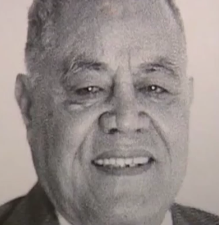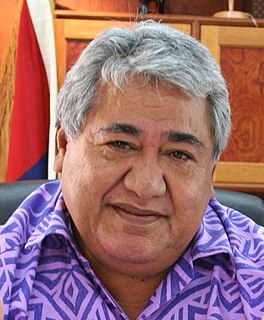 |
|---|
| Constitution |
Members of the Legislative Assembly of Western Samoa were elected on 4 February 1961. The 46 members consisted of 41 Samoans elected in single-member constituency and five Europeans elected from a nationwide constituency.
 |
|---|
| Constitution |
Members of the Legislative Assembly of Western Samoa were elected on 4 February 1961. The 46 members consisted of 41 Samoans elected in single-member constituency and five Europeans elected from a nationwide constituency.

At the national level, Samoa elects a legislature. The Fono or Legislative Assembly has 51 members elected for a five-year term from 51 electoral constituencies. Prior to 2019, the Legislative Assembly has 49 members, 47 members out of the matai six of whom are elected from two-seat constituencies and 35 from single-seat constituencies, and 2 members by the non-Samoan nationals. The head of state is elected for a five-year term by the Fono.

The Fono Aoao Faitulafono of Samoa has 51 members representing 51 electoral constituencies. Until 1991 voting for candidates in traditional territorial constituencies was by matai (chiefs) suffrage only. After a 1990 plebiscite, universal suffrage was introduced with a voting age of 21.

The Legislative Assembly, also known as the Parliament of Samoa, is the national legislature of Samoa, seated at Apia, where the country's central administration is situated. Samoan Parliament is composed of two parts: the O le Ao o le Malo and the Legislative Assembly.

The Legislative Assembly of Tonga is the unicameral legislature of Tonga. The assembly has 25 members in which 17 members elected by majority of the people for a 5-year term in multi-seat constituencies via the single non-transferable vote system. There are 8 members elected by the 33 hereditary nobles of Tonga. The Assembly is controlled by the speaker of the House who is elected by majority of the elected members of Parliament and constitutionally appointed by the king.
Dr Asiata Alaelua Va'alepa Sale'imoa Va'ai was a Samoan politician and lawyer. He was Member of Parliament for the territorial constituency of Satupa'itea and the leader of the Samoan United Independents Political Party and Samoan Democratic United Party.

Vaʻai Kolone was the fourth prime minister of Samoa and a founder of the Human Rights Protection Party (HRPP) in Samoa. He served as Prime Minister twice, first between 13 April and 18 September 1982, and then from 30 December 1985 until 8 April 1988.

Lotofaga is a village on the south coast of Upolu island in Samoa. Lotofaga is also the name of the larger Lotofaga Electoral Constituency which includes Lotofaga village and two other villages, Vavau and Matatufu.

General elections were held in Samoa on 31 March 2006. The main contesting parties were that of incumbent Prime Minister Tuila'epa Sa'ilele Malielegaoi, of the Human Rights Protection Party (HRPP); and the Samoan Democratic United Party (SDUP). The result was a landslide victory for the HRPP, who won 33 of the 49 seats. The newly founded SDUP secured 10 seats, and the remaining 6 were won by independents.

General elections were held in Samoa on 4 March 2011, in which voters elected 49 members to the Legislative Assembly for its 15th term. Unlike most neighbouring countries in the Pacific, Samoa has established party politics. The major contesting parties were that of incumbent Prime Minister Tuila'epa Sa'ilele Malielegaoi, the Human Rights Protection Party (HRPP); and the Tautua Samoa Party (TSP), a newly formed opposition party which included candidates from recently disbanded parties like the Samoa Party.

General elections were held in Western Samoa on 27 February 1982. The Human Rights Protection Party won 22 of the 47 seats in the Legislative Assembly and was able to form a government after three independents voted for its leader, Va'ai Kolone, in the vote for Prime Minister.

General elections were held in Samoa on 4 March 2016. The main contesting parties were that of incumbent Prime Minister Tuila'epa Sa'ilele Malielegaoi, of the Human Rights Protection Party (HRPP); and the Tautua Samoa Party (TSP). The HRPP secured a landslide victory, winning 35 of the 49 elected seats in the Legislative Assembly, while 12 independents subsequently joined them, strengthening Samoa's one-party rule and preventing the TSP from obtaining the eight seats required for recognition as a parliamentary party.

Constitutional Assembly elections were held in Western Samoa on 23 July 1960.
Leaupepe Taulapapa Faimaala Fuatino Vaovasamanaia Filipo was a Samoan politician. She was the first female member of the Legislative Assembly, the first woman to be elected Deputy Speaker, and the first female judge in the Lands and Title Court.

General elections were held in Samoa on 9 April 2021 to determine the composition of the 17th Parliament. In March 2021, Fiamē Naomi Mataʻafa, a former member of the ruling Human Rights Protection Party (HRPP) and a former Deputy Prime Minister, was elected to lead the main opposition party, Faʻatuatua i le Atua Samoa ua Tasi (FAST). Prime minister Tuila'epa Sa'ilele Malielegaoi led the HRPP into the election.

General elections were due to be held in Samoa on 21 May 2021. They were called by O le Ao o le Malo Tuimalealiʻifano Vaʻaletoʻa Sualauvi II following the inconclusive results of the April 2021 election, but before the new parliament had even been convened or numerous electoral court petitions settled.